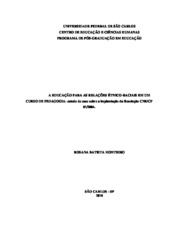A educação para as relações étnico-raciais em um curso de Pedagogia: estudo de caso sobre a implantação da resolução CNE/CP 01/2004
Resumen
This paper discusses the implantation of the Curriculum Guidelines for the Education of Ethnic-racial Relations and for Teaching of History and Afro-Brazilian and African Culture (DCN ERER) in a Pedagogy course. It is considered the interference of the institutional and the cultural organization, as well as the characteristics of the Brazilian post-1995 bringing into account the appropriation of the DCN in question by the involved actors and their reflection in the reorganization of the Pedagogy course. We rely on the conception of race as social construct and racism as a category that operates in social relations in Brazil. We tried to identify and analyze educational practices related to education for ethnic-racial relations considering the category called school practice. School practices are investigated in terms of its contribution to the break with the processes of human exploration in the context of capitalist society, especially considering the race-ethnicity category in the inter-relationship with social class. It was found that the culture of the organization, the political context (State Reform) and the individual efforts of teachers and students interfere in the school practice related to the implementation of the studied guidelines. Besides the analysis of the implantation of the DCN of ethnic-racial relations the role of international organizations was taken into account as well as a nongovernmental organization called Educafro. The investigated Pedagogy course is the one from the Universidade São Francisco- Bragança Paulista / SP. After some determined criteria, this site was considered the best locus for the development of fieldwork.
